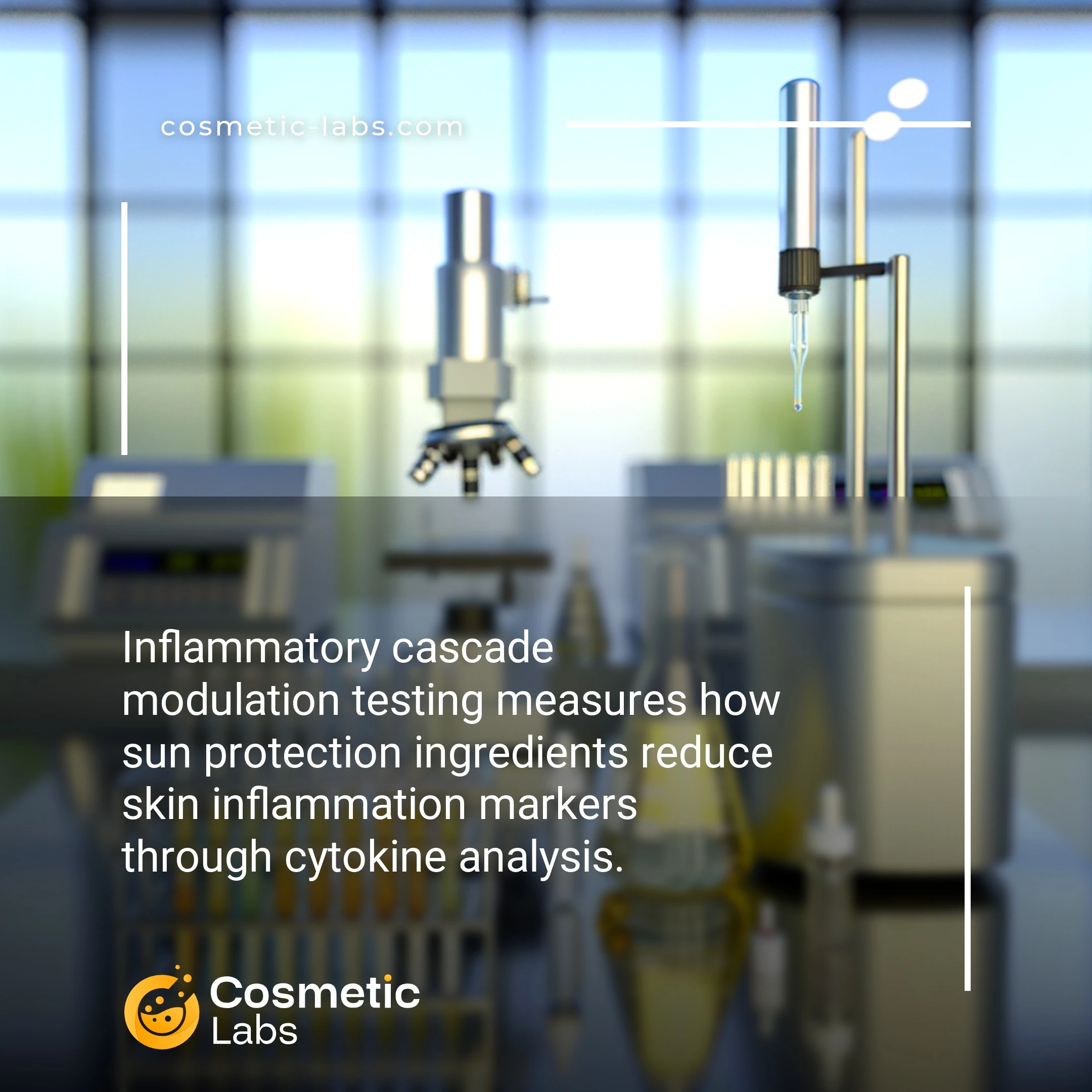Inflammatory Cascade Testing for Sun Protection Products

What is Inflammatory cascade modulation?
Inflammatory cascade modulation testing for sun protection is a preclinical assessment that measures how UV filters and sunscreen formulations affect the skin’s inflammatory response pathways. Labs use cytokine analysis and biomarker evaluation to determine whether your sun protection products trigger or suppress inflammatory reactions like erythema formation. This testing reveals whether ingredients like zinc oxide or chemical filters cause irritation at the cellular level, helping you optimize formulations before clinical trials and ensure your sunscreen won’t cause adverse skin reactions in consumers.
Why do you need this service?
Cosmetic labs use inflammatory cascade modulation testing to validate sunscreen formulations that prevent UV-induced skin damage beyond basic SPF measurements. This specialized service helps brands demonstrate their products’ ability to reduce cytokine release and inflammatory markers in keratinocytes, providing clinical evidence for anti-aging and skin protection claims that differentiate premium suncare products in competitive markets.
Who provides Inflammatory cascade modulation services?
All cosmetic labs providing Inflammatory cascade modulation services
There is no company providing these services at the moment.
Anti-Inflammatory Testing for Sun Protection Products
Sun protection products need more than SPF measurements to prove their effectiveness. Anti-inflammatory testing evaluates how well your formulations control skin’s inflammatory response to UV exposure, providing data that supports marketing claims about soothing and protective benefits.
Cytokine Release Assays
Labs measure specific inflammatory markers like IL-1β, TNF-α, and IL-6 in skin cell cultures exposed to UV radiation. These cytokine release assays show how your ingredients reduce inflammatory signaling pathways. Testing typically runs 24-72 hours post-UV exposure to capture both immediate and delayed responses.
Key inflammatory markers tested include:
- Interleukin-1 beta (IL-1β) for acute inflammation
- Tumor necrosis factor-alpha (TNF-α) for tissue damage response
- Prostaglandin E2 (PGE2) for pain and swelling pathways
Enzyme Activity Inhibition Studies
These tests focus on how your formulations block inflammatory enzymes like cyclooxygenase-2 (COX-2) and lipoxygenase. Labs use standardized enzyme assays to measure inhibition percentages, comparing your products against known anti-inflammatory compounds. Results help validate claims about reducing redness and skin irritation.
Testing protocols examine:
- COX-2 inhibition rates at different concentrations
- 5-lipoxygenase pathway suppression
- Hyaluronidase activity reduction for tissue protection
Partner with specialized labs on our platform to access these preclinical efficacy testing services and build scientific support for your sun protection claims.
Practical Applications of Inflammatory Cascade Modulation Testing for Sun Protection
Cosmetic labs use inflammatory cascade modulation testing for sun protection to validate how UV filters and protective ingredients prevent cellular damage pathways triggered by solar radiation.
Anti-Inflammatory Sunscreen Development
Labs measure cytokine release patterns and inflammatory mediator expression in UV-exposed skin models treated with test formulations. This testing identifies which combinations of zinc oxide, titanium dioxide, and chemical filters best suppress pro-inflammatory signals like TNF-α and IL-1β. Results show up to 65% reduction in inflammatory markers compared to unprotected controls within 24-48 hours post-exposure.
Testing protocols evaluate ingredient synergies between UV filters and anti-inflammatory actives like niacinamide or bisabolol. Labs track specific biomarkers including COX-2 expression and prostaglandin E2 levels to quantify protective effects.
After-Sun Care Product Validation
Post-exposure inflammatory cascade testing validates repair and soothing formulations designed for sun-damaged skin. Labs expose tissue models to controlled UV doses, then apply test products to measure recovery rates and inflammatory resolution. Effective formulations demonstrate 40-70% faster return to baseline inflammatory markers compared to untreated samples.
Testing focuses on ingredients like aloe vera, ceramides, and antioxidant complexes that interrupt damage amplification cascades. Labs measure wound healing factors, barrier repair proteins, and oxidative stress markers to confirm product efficacy claims.
| Testing Parameter | Prevention Products | After-Sun Products |
|---|---|---|
| Primary Markers | TNF-α, IL-1β, COX-2 | IL-6, IL-10, TGF-β |
| Exposure Protocol | Pre-treatment + UV dose | UV dose + post-treatment |
| Timeline | 0-72 hours | 24-168 hours |
| Success Metric | 50%+ inflammatory suppression | 60%+ faster recovery |
Ready to validate your sun protection formulation’s anti-inflammatory properties? Connect with experienced cosmetic labs on our platform to discuss your specific testing requirements and regulatory goals.
